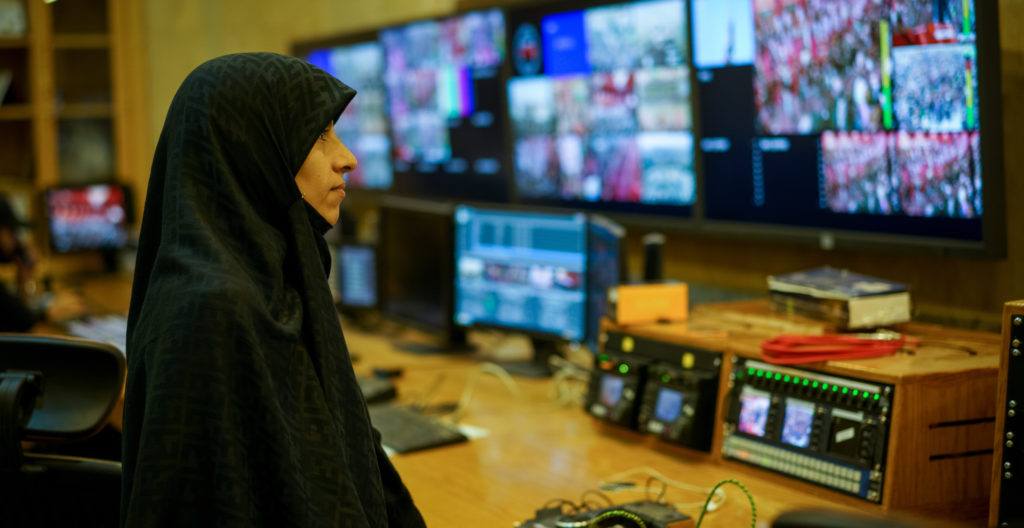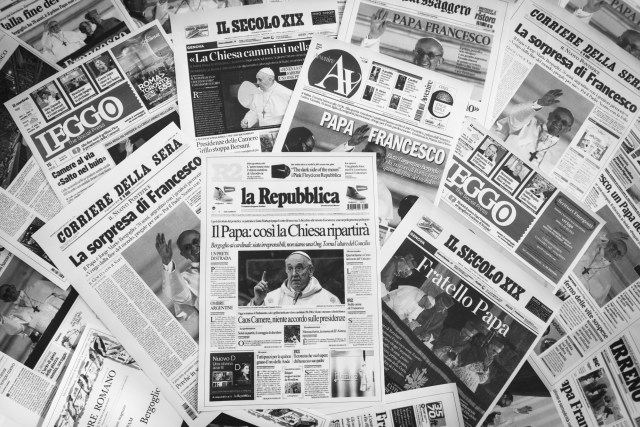Italian newspapers greeting the announcement of the new Pope.

“It’s Hard to Find God on the Front Page”.
That was the headline of a comment piece from last weekend’s Wall Street Journal, which was complaining about American journalism’s retreat from covering religious faith. Its author, Julia Duin of GetReligion.org, noted that “never-ending layoffs, firings and closings left religion among the most decimated of the specialty beats”. She continued:
“Whole regions of the western US and Canada have no staff reporter covering religion… The Dallas Morning News closed its six-page religion section in 2007. The Vancouver Sun reconfigured the beat of its award-winning religion reporter into a “spirituality and diversity” column, while the Seattle Times’s religion writer was reassigned to the Microsoft beat. In 2014 the Boston Globe started a specialty site, Crux, to cover the Catholic Church. They let it go after 18 months, and now the Knights of Columbus sponsors the site.”
If Ms Duin was correct to note the decline of religious journalism, she didn’t help her case by making the much larger number of sports reporters a central part of her complaint. Yes, as she stated, religious giving is much greater than the revenues of America’s major sports, and many more Americans do go to church than attend baseball, football or basketball matches.
But sport will always be more interesting than religion to a newspaper or TV station for the simple reason that we don’t know at the beginning of the weekend if the Dallas Cowboys or Miami Dolphins will win their games or not. We do know that Father Jones is going to talk about Jesus and neighbourliness and prayer. Only if he announces that he is becoming a woman or a Muslim is the press likely to be interested and, given recent history, that’s publicity the Church could do without. If all your core beliefs were announced to the world 2,000 years ago, and are all contained in the best-read and best-selling book of all time, you have a problem appealing to an industry that is called ‘News’.
If religious people have to be realistic about the level of resource that media companies will devote to issues of religion, there does have to be a greater awareness of what is lost when there’s little investment in understanding of faith or faith communities. For example:
- In the wake of 2016’s surprise presidential result, The New York Times admitted that it might have been less surprised if it had been better connected with the country’s Bible Belt. As Katie Harrison’s “Believers in Trump” documentary explains, white evangelicals may not have approved of his personal morality but the Republican nominee’s commitment to put a judge on the US Supreme Court – who would most probably return abortion laws to individual states – was enough to give him 80% of their votes.
- Even in increasingly secular countries like Britain, the Church of England has, through its parish system, a truly nationwide presence. Unlike the Conservative Party, it’s in every inner city. Unlike Labour, it’s in every rural community. And as events such as the Grenfell Tower inferno demonstrated, the church, mosque and synagogue are there 24/7 when their “fourth emergency services” are required. They are still there when most local government caseworkers have gone home. And often much more ethnically diverse and far more varied in wealth and circumstance than, for example, the media. It’s no accident that it’s faith communities who again and again are aware of injustices such as food poverty before most others. They live at the frontline and with frontline people.
- And I hardly need to spell out the third argument for better religious literacy within newsrooms. The fact that, in 2015, people spent more time reading Graeme Wood’s “What ISIS Really Wants” (sub-heading: “The Islamic State is no mere collection of psychopaths. It is a religious group with carefully considered beliefs, among them that it is a key agent of the coming apocalypse. Here’s what that means for its strategy—and for how to stop it”) from The Atlantic than any other article on the internet wasn’t just a reminder to the very secular media class that there might be an appetite for religiously-informed subject matter, it reminds all of us that the most unstable region in the world – the Middle East, if you hadn’t already guessed – cannot be properly understood if we lack a basic grasp of the religious teachings (and the perversions of those teachings) that motivate its peoples.

Religion is not the only subject area that – because of the news industry’s economic challenges – is receiving less journalistic resource. With foreign coverage particularly expensive, events in unfashionable parts of the world are in greater darkness, too.
The centralisation of news gathering in major cities has meant there was not just shock, but incomprehension within the newsrooms of London and Brussels and New York at the angry mood in the ‘flyover’ places and their votes for Brexit, Trump, Orban, Grillo and the like. With much less journalistic infantry to deploy, there are quite simply more gaps in the scrutiny of what takes place in local courts and national parliaments.
The economic realities cannot be wished away, but the best media operations will reflect on what they could do to minimise the impact of them. That thinking could begin by appointing people with more diverse hinterlands. The candidate from Tyneside for the consumer affairs reporting role may have to be based in London but at least they would not be yet another employee from the home counties. That pictures editor who chairs the school attached to her synagogue might ensure that next time faith schools are discussed at news conference there might be at least one voice who doesn’t want them all shut down.
When religion is sidelined from the media and from the public square we don’t just lose an opportunity to reflect on how Catholic Social Teaching might help us to recognise the communitarianism missing from the individualistic and materialist outlooks that dominate both the modern Left and Right. We don’t just miss warnings from clerics that, as religion retreats, the danger is that it is nationalism rather than liberalism that fills the space it once occupied.
When religion is sidelined we are not just sidelining the inheritance of believers – we are sidelining an inheritance that is everybody’s. Throughout the dark ages, the church and monastery were refuges for thoughtful people from all walks of life. When the church was too close to the state and much richer than it should have been, it was able to afford to be the greatest of patrons. When we marginalise religion we are marginalising all of that. We are marginalising the wisdom of the ages.










Join the discussion
Join like minded readers that support our journalism by becoming a paid subscriber
To join the discussion in the comments, become a paid subscriber.
Join like minded readers that support our journalism, read unlimited articles and enjoy other subscriber-only benefits.
Subscribe